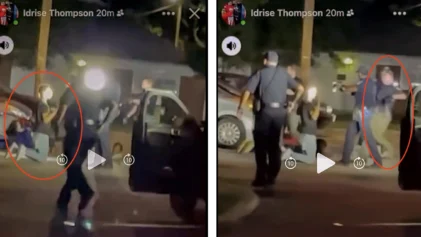An Ontario judge cited a defendant’s “social history” as reasoning for his lenient judgment against the young Black man, who was caught with a loaded handgun after fleeing police.
In his judgment, Ontario Superior Court Justice Shaun Nakatsuru addressed the systemic racism and discrimination often faced by Black Canadians in the justice system, contending that such factors should be considered in criminal sentencing.

In his ruling, Toronto Justice Shaun Nakatsuru took into account the systemic racism and societal factors that may contributed to the defendant’s criminal behavior. (Getty Images)
His lengthy addendum, released last week, also noted how social circumstances, including poverty, can contribute to future criminal behavior. Nakatsu said he released the ruling so that “every judge on every sentencing of a Black offender” may consider it.
Kevin Morris was just 22 at the time of his 2014 arrest, The National Post reported. Police were responding to reports of a home invasion when they spotted a group of Black man walking in a parking lot. An officer stopped them, but Morris fled.
He was hit by a police cruiser during his escape, but he kept running, ditching his jacket with a loaded .38-caliber gun in the pocket.
A jury found him guilty of possession of a loaded, prohibited firearm, among other crimes and he faced a minimum of four years in prison. Morris’ lawyers, however, sought a one-year sentence before a reduction for being struck by the police car, according to the paper.
“It seems like not a day goes by without the media reporting yet another gun tragedy … sometimes very horrible ones,” Nakatsuru’s ruling read. “It happens in every neighborhood. None are immune from gun violence. People are rightfully outraged and bewildered by it. They feel powerless in its onslaught. Afraid.”
“My role is to give expression to that fear,” it continued. “To condemn the crime and those who do it. But it is not my role to give in to that fear, no matter how strongly it seizes the community’s psyche. Reason must control emotion in sentencing. Because in our system, a sentence is not just about the crime. It must be also about the offender.”
In his judgment, Nakatsuru noted that Black Canadians’ experiences are rooted in slavery, colonialism and race-based segregation. He then discussed the “cyclical and compounding” racism perpetuated by schools, the government and police, noting the disparate education, hiring and pay that leave certain communities marginalized and impoverished.
“Recognizing, as the law must, that individuals are held responsible for the acts they commit that breach the criminal law, the reality is that this choice to act may be constrained by an offender’s life circumstances,” Nakatsuru wrote.
Morris, the son of Jamaican immigrants, has faced many hardships in his lifetime, the court heard, according to the National Post. His father died when he was 7 years old, after which his mother constantly struggled to make ends meet. The young man’s upbringing would ultimately be “influenced by the streets.”
The judge said he could understand why a young man with Morris’ background, who had already experienced so much trauma, might carry a gun. He also said he didn’t consider Morris fleeing police as a reason to lengthen his sentence, accepting “systemic issues that have led to distrust between the police and Black men.”
Nakatsuru took a similar stance earlier this year in the case of Jamaal Jackson, urging his fellow justices to take notice of systemic racism. He also declined to apply the mandatory approach used in the sentencing of Indigenous offenders.
Morris was ultimately given a 15-month sentence, minus three months for being hit by the police car and being questioned by police after requesting a lawyer, according to the newspaper. Nakatsuru acknowledged that his sentence was “lenient” and urged Morris not to blow it.


